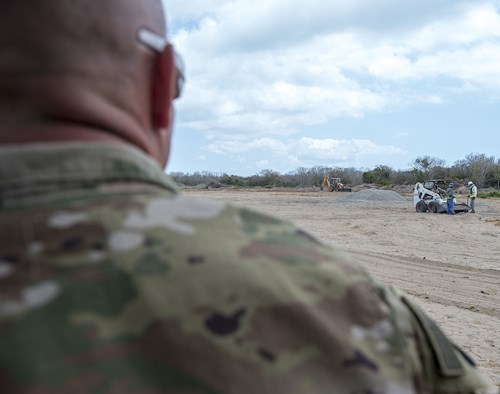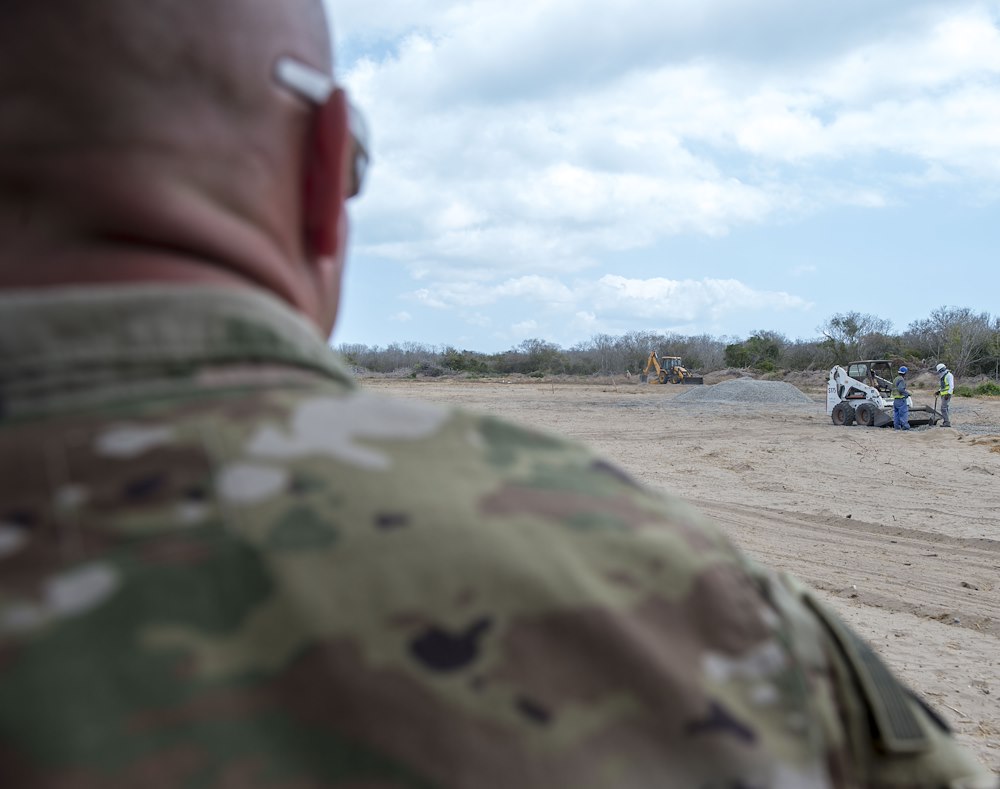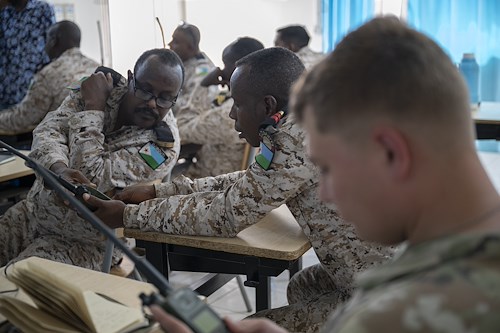Gallery contains 10 images
×
Photo 1 of 10
CJTF-HOA team builds rapport during battlefield circulation visits
U.S. Army Lt. Col. Todd Martin, safety officer assigned to the Combined Joint Task Force - Horn of Africa (CJTF-HOA) Safety directorate, watches local national workers during a battlefield circulation site visit at Camp Simba in Manda Bay, Kenya, Feb. 24, 2018. The CJTF-HOA Safety and Inspector General directorates provide support to the service members, Department of Defense civilians, and local national and third-country national contractors who work on the camp. Though many of the members at the camp don't fall under CJTF-HOA, many of the concerns that affect the CJTF-HOA personnel also affect them and vice versa. (U.S. Air Force photo by Staff Sgt. Timothy Moore)
Photo by: Staff Sgt. Timothy Moore
Photo 2 of 10
CJTF-HOA team builds rapport during battlefield circulation visits
U.S. Air Force Lt. Col. Vance Goodfellow, left, 475th Expeditionary Air Base Squadron (EABS) commander, speaks with U.S. Army Lt. Col. Todd Martin, safety officer assigned to the Combined Joint Task Force - Horn of Africa (CJTF-HOA) Safety directorate, about water tanks during a battlefield circulation site visit at Camp Simba in Manda Bay, Kenya, Feb. 24, 2018. Camp Simba is currently operated by the 475th EABS, who fall under the 435th Air Expeditionary Wing, but the property hosts CJTF-HOA personnel and is in the CJTF-HOA area of operations. As such, the CJTF-HOA Safety and Inspector General directorates provide support to the service members, Department of Defense civilians, and local national contractors who work on the camp. (U.S. Air Force photo by Staff Sgt. Timothy Moore)
Photo by: Staff Sgt. Timothy Moore
Photo 3 of 10
CJTF-HOA team builds rapport during battlefield circulation visits
U.S. Army Maj. Robert T. Paul, command inspector general, and U.S. Air Force Tech. Sgt. Starr Day, assistant inspector general, talk with local national contractors during a battlefield circulation site visit at Camp Simba in Manda Bay, Kenya, Feb. 24, 2018. While assigned to the Combined Joint Task Force - Horn of Africa Inspector General directorate, Paul and Day provide support to the service members, Department of Defense civilians, and local national and third-country national contractors who work on the camp. Though many of the members at the camp don't fall under CJTF-HOA's command, many of the concerns that affect the CJTF-HOA personnel also affect them and vice versa. (U.S. Air Force photo by Staff Sgt. Timothy Moore)
Photo by: Staff Sgt. Timothy Moore
Photo 4 of 10
CJTF-HOA team builds rapport during battlefield circulation visits
U.S. Air Force Lt. Col. Vance Goodfellow, left, 475th Expeditionary Air Base Squadron (EABS) commander, and U.S. Army Lt. Col. Todd Martin, safety officer assigned to the Combined Joint Task Force - Horn of Africa (CJTF-HOA) Safety directorate, look at trees that are being cleared during a battlefield circulation site visit at Camp Simba in Manda Bay, Kenya, Feb. 24, 2018. Camp Simba is currently operated by the 475th EABS, who fall under the 435th Air Expeditionary Wing, but the property hosts CJTF-HOA personnel and is in the CJTF-HOA area of operations. As such, the CJTF-HOA Safety and Inspector General offices provide support to the service members, Department of Defense civilians, and local national contractors who work on the camp. (U.S. Air Force photo by Staff Sgt. Timothy Moore)
Photo by: Staff Sgt. Timothy Moore
Photo 5 of 10
CJTF-HOA team builds rapport during battlefield circulation visits
U.S. Army Maj. Robert T. Paul, left, command inspector general assigned to the Combined Joint Task Force - Horn of Africa (CJTF-HOA) Inspector General (IG) directorate, talks with a Department of Defense (DOD) contractor during a battlefield circulation site visit at Camp Simba in Manda Bay, Kenya, Feb. 24, 2018. The CJTF-HOA IG and Safety directorates provide support to the service members, DOD civilians, and local national and third-country national contractors who work on the camp. Though many of the members at the camp don't fall under CJTF-HOA's command, many of the concerns that affect the CJTF-HOA personnel also affect them and vice versa. (U.S. Air Force photo by Staff Sgt. Timothy Moore)
Photo by: Staff Sgt. Timothy Moore
Photo 6 of 10
CJTF-HOA team builds rapport during battlefield circulation visits
U.S. Army Lt. Col. Todd Martin, left, safety officer assigned to the Combined Joint Task Force - Horn of Africa (CJTF-HOA) Safety directorate, speaks with CJTF-HOA personnel assigned to Camp Simba in Manda Bay, Kenya, about safety concerns during a battlefield circulation site visit Feb. 24, 2018. The CJTF-HOA Safety and Inspector General directorates provide support to the service members, Department of Defense civilians, and local national and third-country national contractors who work on the camp. Though many of the members at the camp don't fall under CJTF-HOA, many of the concerns that affect the CJTF-HOA personnel also affect them and vice versa. (U.S. Air Force photo by Staff Sgt. Timothy Moore)
Photo by: Staff Sgt. Timothy Moore
Photo 7 of 10
CJTF-HOA team builds rapport during battlefield circulation visits
U.S. Air Force Tech. Sgt. Starr Day, right, assistant inspector general assigned to the Combined Joint Task Force - Horn of Africa (CJTF-HOA) Inspector General (IG) directorate, talks with a service member and a Department of Defense (DOD) contractor during a battlefield circulation site visit at Camp Simba in Manda Bay, Kenya, Feb. 24, 2018. The CJTF-HOA IG and Safety directorates provide support to the service members, DOD civilians, and local national and third-country national contractors who work on the camp. Though many of the members at the camp don't fall under CJTF-HOA's command, many of the concerns that affect the CJTF-HOA personnel also affect them and vice versa. (U.S. Air Force photo by Staff Sgt. Timothy Moore)
Photo by: Staff Sgt. Timothy Moore
Photo 8 of 10
CJTF-HOA team builds rapport during battlefield circulation visits
U.S. Army Lt. Col. Todd Martin, left, safety officer assigned to the Combined Joint Task Force - Horn of Africa (CJTF-HOA) Safety directorate, speaks with U.S. Air Force Lt. Col. Vance Goodfellow, 475th Expeditionary Air Base Squadron (EABS) commander, about a safety inspection he performed during a battlefield circulation site visit at Camp Simba in Manda Bay, Kenya, Feb. 24, 2018. Camp Simba is currently operated by the 475th EABS, who fall under the 435th Air Expeditionary Wing, but the property hosts CJTF-HOA personnel and is in the CJTF-HOA area of operations. As such, the CJTF-HOA Safety and Inspector General directorates provide support to the service members, Department of Defense civilians, and local national contractors who work on the camp. (U.S. Air Force photo by Staff Sgt. Timothy Moore)
Photo by: Staff Sgt. Timothy Moore
Photo 9 of 10
CJTF-HOA team builds rapport during battlefield circulation visits
U.S. Army Maj. Robert T. Paul, far left, command inspector general, and U.S. Air Force Tech. Sgt. Starr Day, far right, assistant inspector general, talk with service members during a battlefield circulation site visit at Camp Simba in Manda Bay, Kenya, Feb. 24, 2018. While assigned to the Combined Joint Task Force - Horn of Africa Inspector General directorate, Paul and Day provide support to the service members, Department of Defense civilians, and local national and third-country national contractors who work on the camp. Though many of the members at the camp don't fall under CJTF-HOA's command, many of the concerns that affect the CJTF-HOA personnel at the camp also affect them and vice versa. (U.S. Air Force photo by Staff Sgt. Timothy Moore)
Photo by: Staff Sgt. Timothy Moore
Photo 10 of 10
CJTF-HOA team builds rapport during battlefield circulation visits
U.S. Air Force Tech. Sgt. Starr Day, assistant inspector general assigned to the Combined Joint Task Force - Horn of Africa (CJTF-HOA) Inspector General (IG) directorate, talks with service members during a battlefield circulation site visit at Camp Simba in Manda Bay, Kenya, Feb. 24, 2018. The CJTF-HOA IG and Safety directorates provide support to the service members, Department of Defense civilians, and local national and third-country national contractors who work on the camp. Though many of the members at the camp don't fall under CJTF-HOA's command, many of the concerns that affect the CJTF-HOA personnel also affect them and vice versa. (U.S. Air Force photo by Staff Sgt. Timothy Moore)
Photo by: Staff Sgt. Timothy Moore
Members of the Combined Joint Task Force - Horn of Africa (CJTF-HOA) Safety and Inspector General (IG) directorates recently completed another site visit during their battlefield circulation when they visited Camp Simba in Manda Bay, Kenya.
Directed by CJTF-HOA leadership, these battlefield circulation visits allow CJTF-HOA Safety and IG members to visit contingency locations (CLs) within the command’s area of responsibility (AOR) for the purpose of familiarization and rapport building.
“Our focus is not Camp Lemonnier but our (CLs) in and around our AOR and AOI - area of interest,” said U.S. Army Maj. Robert T. Paul, command inspector general assigned to the CJTF-HOA IG directorate. “We aren’t going there with specific agendas or inspections, just to go down to let everyone know of our presence. We are here to represent and assist them if needed and get a general feeling of everything that is out there.”
The visit to Camp Simba was one of several locations the CJTF-HOA Safety and IG teams hope to visit during their rotation.
“We go out and make sure the HOA personnel … are taken care of safety-wise and IG-wise,” said U.S. Army Lt. Col. Todd Martin, safety officer assigned to the CJTF-HOA Safety directorate. “(We) make sure that any issues or concerns they have are brought back to the command here in Djibouti.”
For Martin, the safety of the CJTF-HOA personnel is his concern, as some of the CLs they visit during the battlefield circulations are not operated by forces that do not fall under the command of CJTF-HOA.
Still Martin goes to inspect the entire location, inside and outside, for safety concerns including checking for up-to-date safety regulations and programs. He also looks at concerns the CL’s commanding officer may have and discusses his findings, both good and bad, often offering best practices he’s found in other locations.
“If you don’t build a rapport with the person who is in charge, then they’re not going to be able to take care of your HOA folks as well,” Martin said. “If he’s looking at a safety concern for his folks, it’s going to affect the HOA personnel as well.”
Because some of the location’s personnel don’t fall under CJTF-HOA’s command, CJTF-HOA Safety can be limited in what they can have directed as safety concerns that need improvement, with many of them needing to be handled by the CL unit’s command. However, Martin said he can influence it by giving a strong recommendation to CJTF-HOA’s commanding general, who can talk to the other commands and confirm safety concerns that not only affect their personnel but also CJTF-HOA personnel at the location.
For Martin in the safety realm, these visits seem to come down to one important question: “Do you need my help?”
That question could also be applied to the IG team during their visits.
“One of our main reasons (for our visits) is to go out and assess the climates - how the leadership is doing,” said U.S. Air Force Tech. Sgt. Starr Day, assistant inspector general assigned to the CJTF-HOA IG directorate. “Secondary would be the morale and how it is sustained.”
The CJTF-HOA IG team looks at everything from gym equipment and food issues to pay and work problems.
“Our bigger concerns are things that can immediately affect the service member and the progression of their career,” Day said. “Let’s say you are having a pay issue. That’s going to affect the mission because if you can’t pay your bills, you can’t take care of your family back home. It distracts you from what you have to do.”
They also look to see if anything can or is being done about the issues.
“One of the benefits about the IG is we can get rid of the bureaucracy,” Paul said. “We have that ability (to go directly to the source) - not skipping or jumping across the chain of command but to find the information and let people know what procedures to go for so they aren’t wasting their time going down one path when we can guide them down this other path that can get them assistance at their location.”
Like the CJTF-HOA Safety directorate, the IG also takes best practices and lessons learned at one location to another.
Furthermore, the CJTF-HOA IG team is able to talk to everyone at a CL.
“As a (Department of Defense) joint-trained command inspector general, I represent everybody - all uniform services, (General Schedule) employees, contractors, and local national or third-country national hires.”
To collection information about the climate of an organization, the IG team does sensing sessions.
“There is an actual questionnaire that we hand out,” Day said. “We can either give it to individuals or groups of individuals depending on how big the site is. There are two sheets. There is one sheet that’s simple, and it has seven to eight comprehensive questions. There is another that has 18, which is the more formal one we tend to give to larger sites and to individuals.”
The questionnaires ask various questions about things such as communication flow, feeling valued, morale, what they think is going good, and even what an individual would change if they were the commanding officer for a day.
Though the initial visit to each location can bring out some negatives, it is really meant to establish a basis for any possible future visits.
“Don’t wait until there’s an identified issue or problem to do the sensing session because you have nothing to compare or base it against,” Paul said. “I like to throw out morale. You go in there, they are having issues or problems, and they say, ‘Our morale is a six.’ Some commanders will say, ‘We need to do something to fix this.’ Now if you do a baseline, maybe when they showed up their morale was a five. So, their morale has actually gone up.”
It is for this reason that both Paul and Day suggest organizations contact their IG team early to get them out to their sites.
“It’s hard to assist people when you’ve never been to their locations,” Paul said.
Regardless if they are requested, both the CJTF-HOA Safety and IG teams plan to visit at least one CL every month.



































